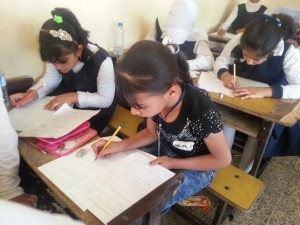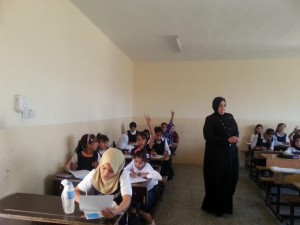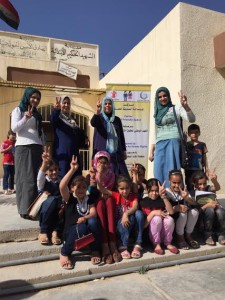A contribution of ours for the IDP children to exercise their right to education, the supervising authority on CFS in Hay Al-Mansour in Kirkuk /Iraq subordinate to National Institute for human rights
– NIHR implemented the activities below during April and May, 2015.
- Conducting field survey on the children in Hay Al-Mansour to identify the numbers of students who are not enrolled in school, for the academic year 2014-2015 due to their displacement in Kirkuk province.
- Specified (50) students not enrolled to study for the following reasons:-
- The inability of their families to afford studying expenses of clothing/stationery/various expenses tuition for student.
- Distances between their areas of residence and schools for the IDPs are far.
- Disapproval of their families to continue studying in especially for the girls.
And after recognizing the results of the field survey the following actions were taken:-
- Forming a team of administrative staff to deal with the situation.
- The agreement with the management of the school of (Shahid al-Hakim) elementary for the purpose of opening the files for the IDP students who did not attend school for 2014-2015
- Invite the parents of children to a panel discussion for the purpose of discussion to convince them to accept continuing study for their children, especially females.
- Provide students with school books and stationery by CFS staff.
- Provide students with lessons to prepare them for final exams.
- Opening studying files for students after agreement with Al-Shaheed Al-Hakeem elementary school management.
- Provide a daily food for students during receiving lessons in CFS.
- Organizing special ID for students and that is for distinguishing them positively among the rest of the students.
- Rent a car for the purpose of transporting students to and from CFS and exam halls and escort the Center staff with them on a daily basis during the period of final examinations.
- There will be a big celebration for them after they get their exam results and will be honored by the National Institute for human rights.




The National Institute for Human Rights
Iraq – Kirkuk
Non-formal education:
The purpose of non-formal (non-regular) education:
That everyone has the right to education, and that education shall be free, at least in the elementary and intermediate stages, and to be available for all next stages which contributes in developing their abilities according to their scientific and practical qualifications, that can promote and develop safe abilities for the personality of human being and to promote the fundamental rights and freedoms, also it contributes in promoting the understanding, tolerance, and communication among the individuals and groups in the internal and external environment, and the protection of physical, psychological and cognitive abilities that could support life and maintain continuity , And these words advocated by many of the agreements on cultural rights and the Declaration of human rights and the International Covenant on economic, cultural, social, economic as well as the Convention on the rights of the child issued in 1989, which in turn includes human rights, child rights, gender equality, and the right of everyone to participate.
And from this logic the (NIHR) Organization Has been created, and one of its most important priorities and specially in current phases is caring about IDP children who are of school age (6-15) and they did not catch up to public schools in their areas of residence because of conflicts and crises and armed conflicts in some Iraqi regions and provinces (Salah al-Din, Diyala, Anbar, Ninawa) which led to the destruction of the infrastructure of those areas especially relating to education (e.g. schools – educational institutions) and children have been involved in the armed conflict directly and indirectly Through recruitment and exploitation in armed groups as well as the vulnerability of girls to early marriage (forced) as well as exposure to other situations such as their use as human shields and separated from their families and as a result for these causes led to the displacement of large numbers of students ‘ families to safer areas, affected negatively on those areas that have been displaced to as a result of the worsening of the crisis and incapacity of schools and institutions, in addition to the lack of properties and development requirements of these institutions which negatively affected the path to formal education in their current areas of residence and there are many other reasons that prevent boys and girls of their right to formal education, and they are as follows:
- Poor financial resources for IDP families to buy basic school supplies and clothes and places of residence.
- The far distance between schools for IDP children and places of residence.
- Lack of sufficient schools for IDP children and considerable momentum because few schools allocated for them not enough for the real numbers, where the number of students per class to 60 students.
- Loss of many families during their displacement of personal identification documents is standing barriers against enrolling their children in public schools in middle of bureaucratic procedures produced by educational institutions.
The NIHR is committed to the particular standards adopted in the field of work and that, in turn, contribute to enhancing the overall response and give particular attention to the need for a good diagnosis at all stages as follows:-.
- Opportunities for non-formal education: access to safe and appropriate educational opportunities through attention to health, water, sanitation, nutrition and shelter (secure environment).
- Promote education and effective learning: through training and provide courses and professional development, support and evaluation.
- Management and human resources managing: represent assigning and testing and assigning conditions and service for human resources in the field of education.
- Planning and implementation: by issuing policies and procedures for implementation, monitoring and evaluation as well as follow-up and support.
- Child protection policy: practices and structures and procedures made by NIHR to confirm as safe for the child that would provide security and happiness to children

